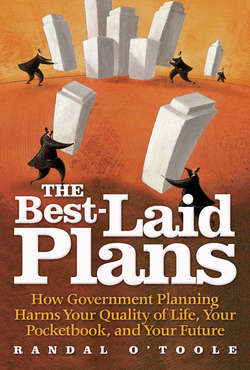Читать книгу The Best-Laid Plans - Randal O'Toole - Страница 20
На сайте Литреса книга снята с продажи.
The Forecasting Problem
ОглавлениеDuring World War II, Kenneth Arrow—who would later win a Nobel Prize in economics—was ordered to help with long-range weather forecasts for the Army Air Corps. His group soon realized that their forecasts were no better than numbers pulled out of a hat, and they asked to be assigned to more useful work. “The Commanding General is well aware that the forecasts are no good,” they were told in reply. “However, he needs them for planning purposes.”6
In addition to needing data about the present, planners need data about the future. According to one planning advocate, planners “can take account of processes which are occurring so slowly, or will begin to occur so far in the future, that no single producer could be aware of their existence.”7 Economist Gerald Sirkin scoffs, “What is this mysterious prophetic vision that comes to a man when he sits at a desk in the central authority but not when he sits at a desk in a business or university?”8
Planners typically write plans for the next 10 years or more. Some plans are even ostentatiously called “20-year plans” or “50-year plans.” For such plans to be worthwhile, planners must be able to accurately answer such questions as
• What technologies will be available in the future?
• How much will land, energy, and other resources cost?
• How will individual tastes and preferences change?
• How will people earn their incomes?
None of these questions can be answered with any degree of confidence. Yet any plan that is based on inaccurate answers to even one of these questions is likely to be drastically wrong, locking people into expensive but unnecessary policies and programs. Despite the absolute need for accurate predictions, planners must contend with the rather unstartling Law of the Future:
